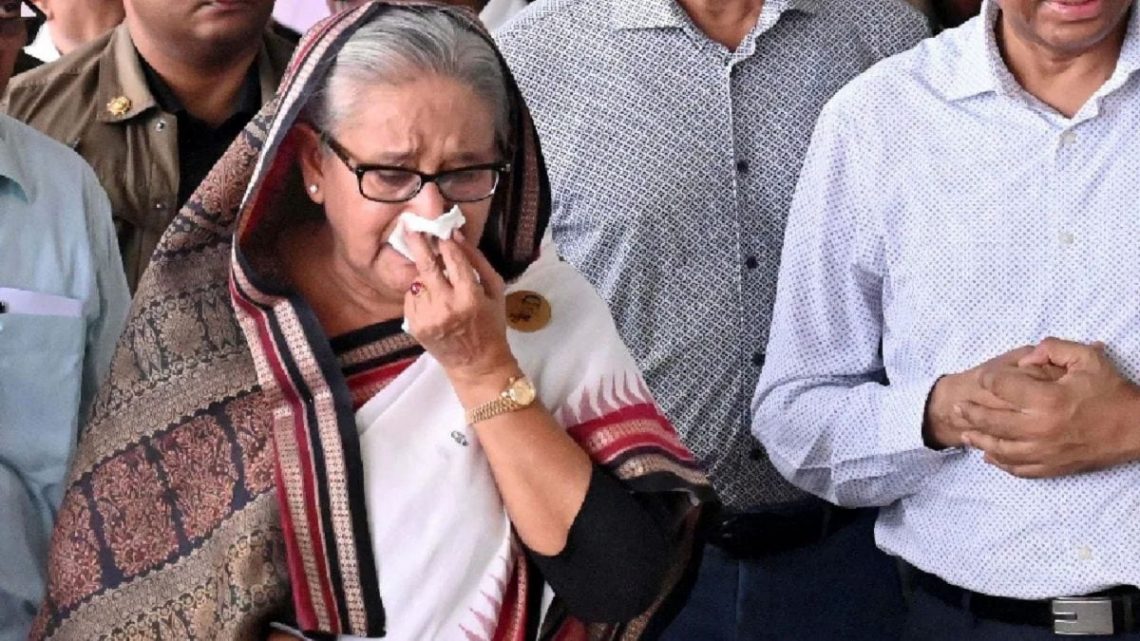Muhammad Yunus-led interim government in Bangladesh said it will wait for the response for a “certain time” from the Indian government on its formal request to extradite former prime minister Sheikh Hasina and if nothing is received within “natural time”, it will serve a note of urgency.
On Monday (December 23), the foreign ministry of Bangladesh, through its mission in New Delhi, had sent a Note Verbale to the Indian government, seeking the repatriation of Hasina for judicial proceedings in Bangladesh Earlier on Monday, under the extradition treaty between the two neighbouring countries.
India and Bangladesh had signed an extradition treaty in 2013, which was later amended in 2016, providing a legal framework for such requests.
“We informed the Indian government through a Note Verbale (diplomatic note) that we want her (Hasina) back for the judicial process,” Touhid Hossain, the advisor on foreign affairs in Bangladesh interim government in Dhaka said.
On August 5, in the wake of a mass uprising against her Awami League government, Hasina fled from Bangladesh and flew to an Indian Air Force base onboard a military aircraft.
On Tuesday (December 24) evening, Bangladesh’s foreign ministry spokesperson Mohammad Rafiqul Alam was asked during the weekly briefing about Yunus government’s next step to bring back Hasina, to which he said: “The diplomatic note was served on Monday. As far as I know, there has been no response from India in the government channel. We won’t make any comment in this regard right now. Rather, we will wait for India’s response. Our next course of action will be decided based on that response.”
“As far as I remember there is no time limit in the extradition treaty. So we have to wait for the response from the Indian government. We will wait for a certain time. There is a natural time to respond to anything. If we don’t get any response within that time, we will serve a note of urgency. We will let them know that we are expecting a response in this regard. The note was served only yesterday (Monday). So it’s difficult to talk about the next step right now,” Rafiqul further said.
Referring to the issue as sensitive, the Bangladesh’s foreign ministry spokesperson said: “I think there is no opportunity for you or me to comment on such a sensitive issue during normal time. The government of the two countries will decide on this as soon as they feel it is the right time. We should not speculate anything in this regard right now.”
On Tuesday, India’s Ministry of External Affairs (MEA) spokesperson Randhir Jaiswal said: “We confirm that we have received a Note Verbale from the Bangladesh High Commission today in connection with an extradition request. At this time, we have no comment to offer on this matter.”
According to a report by Dhaka Tribune, Hasina is accused in over 100 cases and faces a number of charges, including murder, mass killing and crimes against humanity over killings during the July uprising that led to her fleeing on August 5.
Also her close aides, several leaders of her party – Awami League – and activists had been implicated in multiple criminal cases in Bangladesh, including corruption, murders, abductions, crimes against humanity, and genocide.
On November 26, the International Crimes Tribunal (ICT) issued arrest warrants against Hasina and 45 others in connection with alleged crimes against humanity committed during the July-August protests against the Awami League government.
The ICT was set up by Hasina-led Awami League government in 2009 to investigate and prosecute the suspects for the genocide committed by people, who had been loyal to the Pakistan Army, during the 1971 war for liberation of East Pakistan into Bangladesh.
On August 5, shortly before mobs stormed into her official residence – Gana Bhavan – in Dhaka, Hasina, her sister Sheikh Rehana and some of her aides hurriedly boarded a military aircraft and had flown to Indian Air Force base at Hindon near New Delhi.
Hours after her arrival, External Affairs Minister (EAM) S Jaishankar had said that Hasina had on very short notice sought the approval of Prime Minister Narendra Modi’s government to come to India “for the moment”. Back then, it was speculated that she might leave for Norway, Finland, or the United Kingdom shortly, but Hasina and her entourage continued to stay in India.
Yunus-led interim government took charge of Bangladesh on August 8 and days after it began requesting India for Hasina’s extradition.
On December 9, when India’s Foreign Secretary Vikram Misri visited Dhaka, Bangladesh’s interim government conveyed to him its displeasure over the statements Hasina made from India and requested for her extradition.
With inputs from agencies.
Link to article –
‘If India doesn’t respond in time…’: Bangladesh’s Yunus presses for Hasina’s extradition
